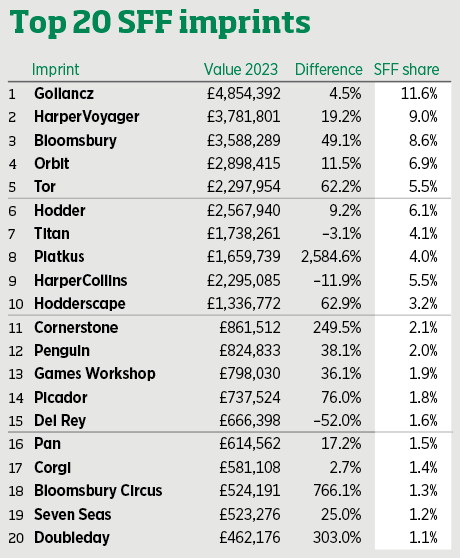You are viewing your 1 free article this month. Login to read more articles.
Science Fiction & Fantasy: genre on course for a record year
Science Fiction & Fantasy is on a roll according to the latest figures from Nielsen BookScan.
As revealed in our Lead Story, Science Fiction & Fantasy is on a Nielsen BookScan record trajectory, sure to crack the £50m mark for the first time ever. In fact, if the sales patterns continue for SFF this year, there is a half decent chance it will exceed £60m for the initial time since accurate records began.
SFF’s total might underplay the small “s” science fiction and fantasy market in the round as there are many authors in BookScan’s Young Adult category that cross the line between YA and SFF (YA is not further broken down by sub-genres). And sometimes this happens with the same title—SFF metadata is often a lawless Wild West that can turn a book chart geek’s hair grey.
Leigh Bardugo is one of those with a foot in both camps. The Shadow and Bone creator is the 17th-bestselling SFF author this year, shifting just under £400,000—£225,000 of which was generated by her January release Hell Bent—while she has earned a further £1.2m through YA. At just over £3m, Sarah J Maas is this year’s biggest-selling SFF author, but she has also shifted an additional nearly £600,000 in YA. Bardugo’s adult titles are published by Gollancz, the leader in our SFF imprint league table; Hell Bent is its bestseller by value, with Ninth House tops by volume on 20,131 copies.
An aside, and this returns to my point about a metadata Wild West: this list is ordered by the imprint field through BookScan’s Total Consumer Market (TCM). There are a few imprints, and I won’t point fingers, that obviously do not take filling out the imprint field accurately as seriously as they should.
Back to Gollancz. As with most imprints near the top of this list, it has its fair share of the BookTok stars such as Bardugo and its second bestselling title of 2023, Sarah Hawley’s A Witch’s Guide to Fake Dating a Demon. But as the oldest pure SFF house, it has over 60 years of backlist to draw on: 70% of its TCM sales derive from titles not published in 2023, the highest percentage in the top 10.

The top two books from second-placed HarperVoyager—the reigning British Book Awards Imprint of the Year—are the paperback and hardback versions of R F Kuang’s Babel; all told, the author has shifted £790,000 in SFF this year (her literary fiction title Yellowface has sold an additional £1.1m). HarperVoyager is not short on backlist, with old hands George R R Martin (£600,000) and Robin Hobb (£225,000) also pitching in.
A newbie on this list is Piatkus, with 88% of its £1.7m derived from Rebecca Yarros (owing to deadlines, this chart was completed prior to the data for the launch of Yarros’ Iron Flame). The Little, Brown imprint had not committed fully to the SFF game until recently, excepting the odd move into urban fantasy and the occasional dip into the category by its legacy authors, such as Nora Roberts’ off-piste vampire and witch series.
Piatkus is one of the reasons Hachette leads the Big Four publishers by a few parsecs in SFF with £15.2m in TCM sales, or a whopping 36.2% share. HarperCollins follows (£6.7m, 16%), with PRH third (£5.3m, 13.3%). Bloomsbury makes it a Big Five on a Maas-led £4.2m—she is responsible for 16 of Bloomsbury’s top 20 SFF titles this year—just ahead of Pan Mac’s £4.1m, which was led by Tor-published TikTok star Olivie Blake’s £798,000.














